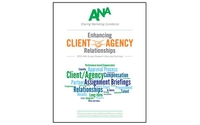
At a time when tensions are rising between advertisers and their agencies over unclear or undisclosed forms of media compensation, the Association of National Advertisers is releasing
findings of a new study intended to shed light and fix some of the issues that are contributing to it. Details of the study will be presented during the ANA’s Advertising Financial Management
conference in Phoenix next week, but the association released highlights and an
executive summarythis morning.
The study,
“Enhancing Client/Agency Relations 2015,” reveals that there is “significant dissatisfaction about the quality of the briefing process and compensation agreements” between
advertisers and their agencies and recommends some simple steps for improving it.
advertisement
advertisement
Most significantly, the study reveals a pronounced disconnect between the views of advertisers and agencies
about the process. While a majority (58%) of advertisers surveyed during the first quarter of 2015 said they provide “clear assignment briefs” to their agencies, less than half that number
(27%) of agency executives who responded felt that way.
Asked whether the current client approval process works well, a majority (54%) of advertisers concurred, while 36% of agency execs
agreed with that statement.
Not surprisingly, agency compensation was one of the most contentious issues revealed in the study: Only 40% of agency executives agreed it was fair, versus 72% of
advertisers.
The findings come at a recent low period in agency/client relations, particularly on the subject of media compensation, because it follows an inflammatory disclosure during the
ANA’s recent media conference by former Madison Avenue media exec turned whistleblower Jon Mandel, who alleged that undisclosed agency rebates and “kickbacks” from the media are far
more pervasive and systemic than most clients are aware of. That disclosure is said to have caused some new tensions between the ANA and its agency counterpart association, the 4As, but the two
organizations are believed to have begun working more closely to tackle the issue since then.
Other highlights from the new study include:
Clients and
agencies are lukewarm on the value that procurement adds to client/agency relationships. Less than half of clients (47 percent) felt that procurement adds value, while only 10 percent of agencies
agree.
Clients (54 percent) and agencies (47 percent) agree that in-house client resources are increasingly becoming a realistic option for clients.
Clients and agencies reported that agencies work well with other agencies, and 65% of clients concur versus a very robust 88% of agencies.
Agency talent remains an issue. Only 56% of clients believed that agencies have the right talent to meet client needs over the next two years. Agencies are slightly more bullish at 64%.
Despite their concerns the majority of both clients (87 percent), and agencies (86 percent) felt that the agency is a valued business partner that plays an
important role in the client’s business strategy, and driving business results.
“There are disturbing legacy issues that continue to plague the partnership
that have been further complicated by blossoming transparency concerns,” ANA President-CEO Bob Liodice said in a statement provided with the release of today’s executive summary, adding
that the association is committed to “making tangible improvements and will be working in partnership with the 4As to actively address these issues.”